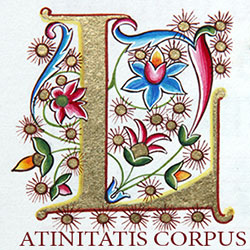
Dome of St Peter’s basilica
We can appreciate Latin command forms by playing with the Papal tweet issued on 6 February, the feast of the Presentation of the Lord when vowed religious are especially remembered:
Omnes nunc viros mulieresque capit mens Nostra religiosam votis vitam viventes: Christum paupertate castitate oboeditione fideles sectantor.
“Right now our mind embraces all men and women living the religious life by vows: they must as faithful people follow Christ by means of poverty, chastity and obedience”.
Notice that sectantor is our formula B command form or what some people call futurity command form. It is used in laws and proclamations and rules. Imagine Charlton Heston giving the 10 commandments in the movie and saying: “Thou shalt Love …”. Here we could say of religious, “they shalt follow”, or “they must follow”. This proclamation of a precept is the reason for this command form here.
By the way, the same command form is also used by Cicero in his letters to friends – as in daily conversation in the home – where he says: scito, “you must know”. It also pops up on Ash Wednesday when the ashes are distributed with the formula: Memento homine …, “Remember human …”. Many peolpe are mindful of the admonition, Memento mori, “Be mindful of dying”, which are the “you” form of the second command. Here sectantor, is the “they” form of a deponent verb, which is passive in form, but active in meaning.
We can play with other command forms.
If you want to put this in the first subjunctive, “let them follow”, it is sectentur.
Another light imperative is the future indicative, sectabuntur, “they will follow”.
It may encourage you to know that in this way we have reached the end of the Latin imperatives for this phrase, unless you want to change the sentence around and use an expression of passive necessity. For example, you could say: iis fidelibus Christus paupertate castitate oboeditione est sectandus, “Christ is having to be followed by those faithful people by means of poverty, chastity and obedience”.
By the way, notice that the tweet does not refer simply to people living a holy, religious life, something which all the baptized are called to do. Rather, this message is particularly intended for professed religious, and so is added the word votis, “by vows”.

